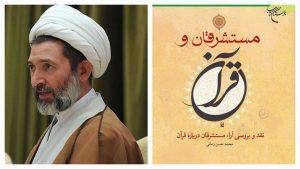
Muḥammad Ḥasan Zamānī, Mustashriqān wa Qurʾān; Naqd wa Barrasiyy-i Ārāʾi Mustashriqān darbāriyi Qurʾān [Orientalists and the Qurʾān; Criticism and Analysis of the Orientalists’ Opinions about the Qurʾān], 7th ed., 1 vol., Qom: Būstān-i Kitāb, 1397, 592 pp.
Undoubtedly, the Qurʾān, as the last Divine Book and the only Scripture without distortion, has a special place among Muslims. However, studies related to the Qurʾān are not limited to Muslims; rather, many non-Muslim Orientalists have been studying the Qurʾān for centuries and have proposed different theories on various topics related to the Qurʾān and have published thousands of works, including books, articles, and encyclopedias. Considering the number of these works on the one hand, and some wrong views by Orientalists on the other hand, it is necessary to criticize these works by Muslim scholars. Mustashriqān wa Qurʾān by Muḥammad Ḥasan Zamānī is an effort in this regard. The author is one of the contemporary Shiite scholars who has special studies on Orientalism and teaches in the Islamic Seminary of Qom and various universities.
This book consists of 6 chapters. The first chapter is about the Qurʾānic activities of the Orientalists. In this chapter, the author discusses in detail these activities in various fields, including translation of the Qurʾān, printing of the Qurʾān, a compilation of thematic dictionaries and encyclopedias, proofreading and printing of manuscripts, and writing books and articles. At the end of this chapter, twelve of the most prominent Orientalists who have had studies and works on the Qurʾān are introduced, including Gustav Flügel, Theodor Nöldeke, Ignác Goldziher, Arthur Jeffery, Montgomery Watt, and Jane Dammen McAuliffe.
In the second to fifth chapters, the author examines and criticizes the views of the Orientalists on the issues related to the Qurʾān in detail. The second chapter is about the source and origin of the Qurʾān. At the beginning of this chapter, the author presents eight general criticisms regarding the works of orientalists. One of them is the fact that the Orientalists, considering that they do not believe in Islam, are less able to get acquainted with the objective view of Muslims on Islamic issues because often a doctrine in a particular culture has a special meaning that an outside researcher is oblivious to it and perceives another concept. Two other important criticisms are the lack of access of Orientalists to many authentic Islamic texts and insufficient attention to the works of Shiites, and only quoting from Sunni books. In this chapter, several theories of the Orientalists about the origin of the Qurʾān are explained and criticized, such as the theory of genius, the adaptation of the Qurʾān from previous Divine Books, the theory of experimental divine revelation, the theory of natural revelation, the theory of religious experience, and the theory of complete adaptation from the culture, beliefs, and etiquette of the inhabitants of Arabian Peninsula.

The subject of the third chapter is the history of the collection of the Qurʾān. Following the topic, the author refers to the issue of distortion of the Qurʾān and rejects it with various reasons and points out the motivations of the Orientalists to prove the distortion through the issue of collecting the Qurʾān. Then, some of the Orientalists’ claims to prove the distortion are pointed out and answered, such as the non-recording of Meccan verses in the Qurʾān, the differences between the codices of the Qurʾān, the Shiite belief in distortion, and the addition of some verses to the Qurʾān. At the end of this chapter, Muḥammad Ḥasan Zamānī gives a correct analysis of the differences in the recitation of the Qurʾān and its lack of connection with distortion.
The fourth chapter responds to some criticisms of the Orientalists about the content and structure of the Qurʾān, such as the four ones by Régis Blachère. In another part, the author responds to criticisms related to Qurʾānic stories, such as repeating stories and not respecting the chronological sequence. Another objection of Orientalists against the Qurʾān is the existence of contradictions in the Qurʾān. The author presents ten alleged contradictions in detail and answers them, and at the end of this chapter, he points out five obvious contradictions in the Old Testament and the New Testament.
The fifth chapter of Mustashriqān wa Qurʾān is about the misunderstanding of some Orientalists towards the teachings of the Qurʾān. First, the author discusses the comprehensiveness of the teachings of the Qurʾān, and then he discusses the views of the Orientalists on the three key issues of predestination and free will, Jihād in the Qurʾān, and the status of women in the Qurʾān. A significant part of this chapter is devoted to the criticisms of Orientalists about the rulings related to women in the Qurʾān and their responses, including the rulings related to ḥijāb, polygamy, and the laws of inheritance.
The sixth and last chapter of this book, in particular, deals with one of the most important works of Orientalists in recent decades in connection with the Qurʾān, namely the Encyclopedia of the Qurʾān, edited by Jane Dammen McAuliffe, and published by Brill Publishers. The author first discusses some of the positive features of this work, such as fairness in some articles and the use of Muslim authors. However, the main part of this chapter is about the mistakes of this encyclopedia, such as the lack of attention to the views of Shiite scholars and the scientific weakness of some authors, which has led to great mistakes in some articles. At the end of this chapter, the book’s conclusionsare presented to the readers in a summary form on 15 pages.
The book’s appendix contains the index of verses, narrations, and people. According to the bibliography, the author has used 216 sources in this book which shows that this is a helpful work for those interested in getting to know the views of Orientalists about the Qurʾān and its teachings and their criticism.
